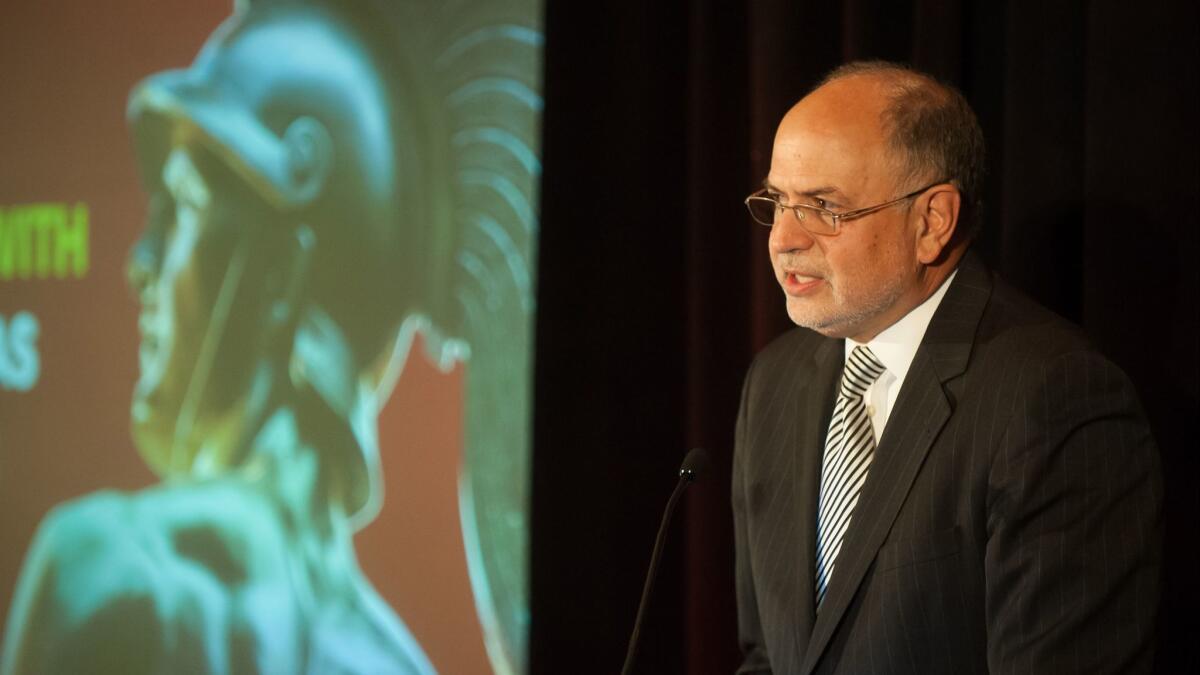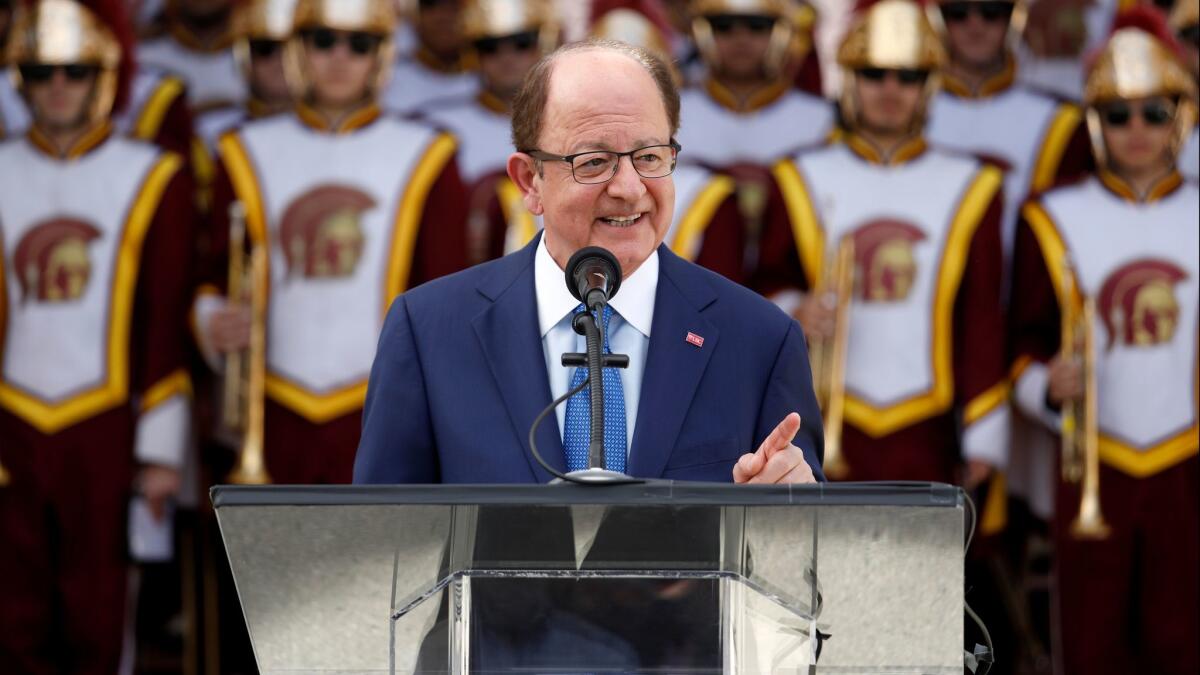Fundraising at USC tumbles amid medical school scandals

USC, known nationally for its aggressive fundraising operation, saw contributions tumble in the second half of 2017, a period in which scandals roiled its medical school.
- Share via
USC, known nationally for its aggressive fundraising operation, saw contributions tumble in the second half of 2017, a period in which scandals roiled its medical school.
An internal accounting reviewed by The Times shows donations to the university were down nearly $100 million between July and December of last year compared with the same period in 2016. The falloff represents a 22% decline and was particularly severe at the Keck School of Medicine, where donations dropped 55%, or roughly $45 million.
Two weeks after the accounting period’s July 1 start, The Times reported that former Keck dean Carmen Puliafito had used methamphetamine and other drugs while running the medical school and treating patients in a campus eye clinic. USC subsequently acknowledged that President C. L. Max Nikias had kept Puliafito, a prolific fundraiser, in the post despite years of complaints from faculty and staff about his behavior.
In the fall, Puliafito’s replacement as dean was forced out after The Times learned that USC had settled a sexual harassment claim against him, and the top university fundraiser for its health sciences program departed amid accusations that he had harassed female subordinates.
USC dismissed the significance of the slump, attributing it to normal fluctuations in donations. Administrators denied it was related to the scandals and said the relationship between university leaders and major benefactors remained strong.
“A slightly lower amount of contributions in this period does not evidence a longer-term falloff,” a university spokesman said.
Two USC employees who regularly deal with contributors said some normally reliable donors did not return their calls and others gave less than usual. The employees, who spoke on the condition of anonymity, said donors told them that they were put off by the back-to-back scandals.
“What we are hearing is that the organization’s moral compass doesn’t fit mine,” said one employee.
Another described donors as “pretty upset” by the way university leaders responded to the crises.
“They say, ‘What’s going on at the top?’” the employee said.

Several university trustees refused to comment. The group of 57, which includes some of the wealthiest and most powerful people in California, is set to meet Wednesday on campus.
USC’s top fundraiser, Albert Checcio, defended what he called “one of the most successful advancement programs in higher education.”
“To suggest that USC or the Keck School of Medicine is struggling to raise funds is fundamentally mistaken,” Checcio, the senior vice president for university advancement, said in a statement. “The timing of gifts fluctuates throughout the year, and any single point in time is not an accurate projection of where the university will net out, especially in a multi-year campaign.”
The drop in donations comes as USC faces mounting costs from the medical school scandals. The university retained a former federal prosecutor from one of the top law firms in the nation to lead an investigation that has lasted more than six months, and it hired a former Sony executive to serve as its crisis communications consultant.
Another potential cost is a possible settlement with the family of a young woman who suffered a drug overdose while partying with Puliafito. Sarah Warren’s family hired high-profile attorney Mark Geragos last year to negotiate a payout from USC. Neither he nor family members have returned reporters’ calls since November. Asked whether there was a settlement, a USC spokesman, Christian Gunning, said in an email: “We are not going to talk about the Warrens.”
In recent months, USC has launched a belt-tightening campaign called Project Renewal. Administrators at every school and university department are expected to trim expenses by about 5% within three years.
The USC spokesman said that the university was in a “strong financial position” and the cost-savings program was a “normal, responsible” business practice that took shape well before the Keck scandals.
Fundraising has been key to USC’s climb in academic rankings and prestige over the last two decades. The university has about 450 employees dedicated full-time to fundraising, and Nikias’ calendar is packed with international and national trips where he courts alumni, parents and other potential donors, sometimes in the company of the school’s marching band.
A cornerstone of USC’s fundraising is a $6-billion campaign launched in 2011, then described as the largest such drive in academic history. The university collected gifts and pledges for future gifts to surpass the goal about 18 months ahead of schedule, according to USC. Trustees awarded Nikias a one-time $1.5 million bonus three years ago, in part for the “exceptional progress” in the $6 billion campaign, according to federal tax filings.
When Puliafito was dean of the medical school, he regularly touted its success at attracting multimillion-dollar gifts from alumni and other benefactors. In the 2015 fiscal year, Keck raised “almost $200 million,” according to the dean’s newsletter that October. He stepped down in March 2016. Total medical school fundraising for the 2016 fiscal year was not immediately available, but in the following fiscal year, the school took in more than $148 million, according to the internal documents.
David Callahan, the editor of Inside Philanthropy and author of “The Givers,” which examines the influence of mega-donors, said a downturn in fundraising at USC could be “a short-term, bad taste in people’s mouth” problem or something more significant.
“You can imagine some donors, if they believe it, feeling that they lost faith in the institution,” Callahan said. When such doubts fester, he added, some universities look for new leadership.
Still, Callahan said, giving patterns can swing and a handful of large donations could wipe out the shortfall altogether.

In its statement, USC said there were several “significant gifts in the works” that will eventually close the fundraising gap at Keck.
Callahan said USC could work to rebuild trust with donors by being transparent about how the university dealt with Puliafito.
University administrators commissioned such a report, but have yet to release any of its findings. The university tapped former U.S. Atty. Debra Wong Yang of the blue-chip firm Gibson, Dunn & Crutcher last summer to lead a probe into Puliafito’s conduct as dean and the university’s response.
Some Keck faculty and staff submitted to rounds of interviews by Yang’s team during the summer and fall, but university leaders have been quiet about what the lawyers uncovered. Trustees have been briefed regularly on the investigation.
USC administrators have refused to say whether any of its findings will become public.
[email protected] | Twitter: @latimesharriet
[email protected] | Twitter: @matthjourno
[email protected] | Twitter: @PringleLATimes
More to Read
Sign up for Essential California
The most important California stories and recommendations in your inbox every morning.
You may occasionally receive promotional content from the Los Angeles Times.













